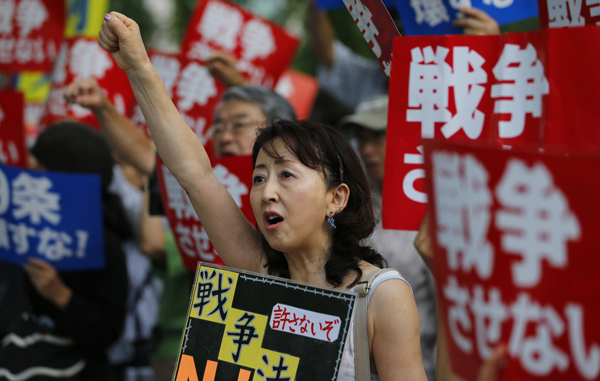Abe's monocratic stewarding of national ship stirs public opposition
(Xinhua) Updated: 2015-06-12 10:21
TOKYO - Japanese Prime Minister Shinzo Abe is forging ahead with his plans to pass contentious security legislation through parliament albeit at a delayed date and in spite of the fact that the vast majority of the public oppose the implications the new bills will have on the nation's future security and the fact the bills themselves have been deemed unconstitutional by a plethora of legal experts on constitutional matters.
Abe's administration has been seeking passage of the bills through parliament in the current Diet session but due to the public's staunch opposition to the bills that would, by-in-large, allow Japan's forces to conduct borderless military operations beyond geographical restrictions if it was deemed that Japan's interests, security, freedom or the safety of one of its allies was under threat.
And contrary to previous promises made by Abe vowing that Japanese troops' lives would not be put in mortal danger under the new reforms, the US saying that it expected Japan to put "boots on the ground" in conflict zones along side its ally in the Middle East, the Korean Peninsular -- should needs arise -- and in other regions where tensions are rising, including in East Asia if needs dictate, discredited such a notion.
"Abe was forced to backtrack on this one too. The prime minister, as ever, is racing ahead to fulfill what he believes is some kind of divine destiny to remilitarize Japan and restore a bygone era of Imperialism here, but is doing so regardless of public or political opinion at home and abroad," pacific affairs research and defense analyst, Laurent Sinclair, told Xinhua.
- End to civilian control over Self-Defense Forces advances Japan's militarization
- China tops Japan in Asian university rankings
- 5.7-manitude quake jolts off northeastern Japan
- Japan gov't ruled to pay Okinawa residents for US base noise
- China overtakes Japan as Asia's No 1 in Times university rankings
- Chinese airlines to launch more air routes to Japan
- Heartache for Japan's real life 40-year-old virgins







